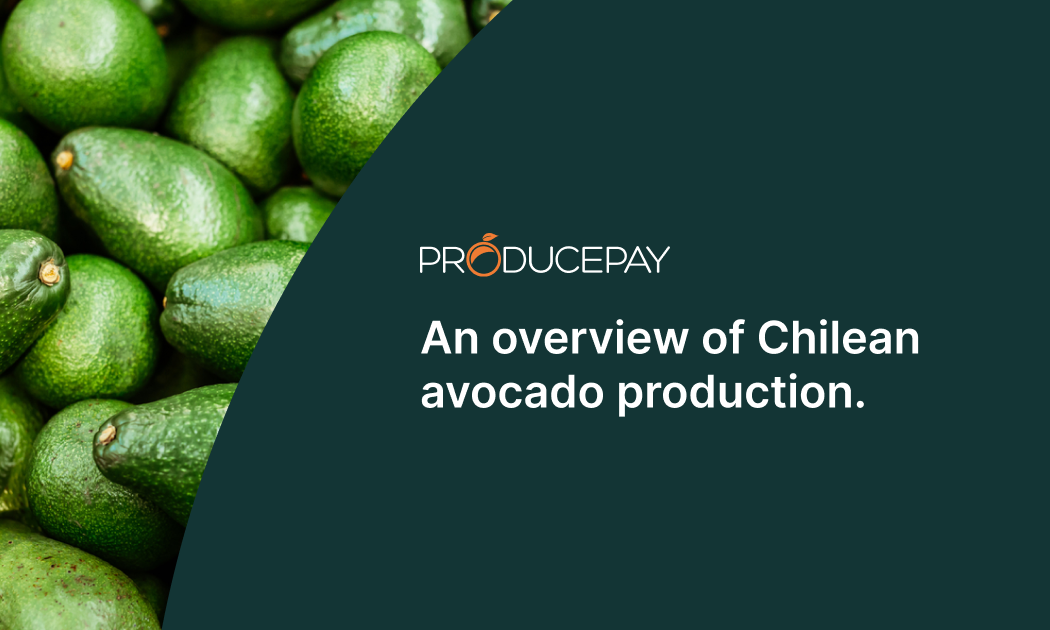
An overview of Chilean avocado production.
Avocado growing has become a major part of the agricultural industry in Chile, with both small-scale and large producers taking advantage of the country’s sunny climate and high nutrient soils to produce some of the best avocados in the world. This has made Chile an important avocado producer and exporter.

Since Hass serves as the main Chilean avocado variant, the country is able to export to various regions, such as Europe, North America, Asia, and South America.
In this blog post, we’ll explore more about the Chilean avocado growing and how recent weather situations in the region have impacted its production.
Avocado Growing Areas in Chile
The Chilean avocado planting area is focused in the central zone due to its Mediterranean climate.
It has 29,224 hectares of avocado orchards between the Coquimbo Region and the O’Higgins Region, with most of the new plantations located on hill slopes to avoid winter frosts, which can severely affect avocado production.
The Coquimbo Region is located in the northern part of Chile and is known for its hot climate and arid conditions. Despite the harsh environment, this region has been able to produce high-quality avocados that are in high demand both locally and internationally.
Meanwhile, the O’Higgins Region is located in the central part of Chile and is known for its moderate climate and wet conditions. This region has become one of the most important areas for avocado production due to its ideal weather conditions, which allow for a longer growing season than other parts of Chile. Additionally, this region boasts some of the highest yields per hectare compared to other regions.
Drought and Frosts in Chile and its Impact on Avocado Production
Chile has accumulated 13 years of continuous drought, an atypical situation that has put great pressure on agricultural production. This became a huge problem for Chilean avocados because cultivating this fruit requires a significant amount of water – one kilogram of avocado needs about three-fourths of tons of water.
The efficient use of water resources is very important, especially when it concerns avocado cultivation. And specifically, in Chile, avocado production relies on techniques such as irrigation, frost protection, and soil irrigation management, as this helps prevent root asphyxiation among avocado trees.
Despite experiencing drought, Chilean avocado cultivation is efficient in the use of water resources, given that there is a wide technified irrigation area, which allows the approximate consumption to be 8,930 cubic meters per hectare.
However, the prolonged drought in Chile still affected irrigation sources, which led to stressful conditions for avocado orchards. Worse, the drought in Chile has been suspected of being associated with increased Botryosphaeriaceae infection in avocados.
Due to the situation, between 2013 and 2020, the agricultural area of Chilean avocado growers went from 14,000 to 4,000 hectares, precisely because of the water shortage. Chilean avocado growers have moved avocado orchards to the southern area of the country, which has more water availability, but with different climate conditions.
For Chile’s 2022/23 avocado season, the estimated production volume is about 186,000 metric tons, a decrease from about 220,000 metric tons during the previous season. This is due to the unforeseen severe spring frosts in the country that led some farms to lose their avocado crops.
Sustainability Measures for Avocado Growing in Chile
It should not be forgotten that sustainability in avocado production is a growing trend that will be very important in the future.
Fruit tree plantations, including avocado, should be reduced in the province of Petorca, which has been the most affected by the drought. This is to avoid more significant pressure on the water resource.
In addition, irrigation systems have to be improved to reduce the water demand for avocado production. Avocado farming requires a significant amount of water and Chile’s dry climate means water conservation is even more vital. Implementing drip irrigation systems and using mulch to retain moisture will help preserve scarce water resources while also reducing runoff which can cause soil erosion and pollute waterways.
The use of agrochemicals also has an effect on the environment as it can contaminate groundwater and nearby bodies of water or pollute the air with its residues. To reduce these impacts, producers should follow strict regulations regarding their use, including using only low toxic pesticides and avoiding overuse or incorrect application.
Avocado producers should also consider the soils where they cultivate avocados; some areas are more prone to erosion than others. For this reason, preventive measures such as terracing and cover crops should be implemented to prevent soil degradation. Forest conservation efforts, such as reforestation programs and enforcing bans on illegal logging activities, should also be paid attention to.
With these best sustainability measures for avocado growing in Chile, farmers can lessen their environmental impact while still producing a high-quality crop. Implementing sustainable agriculture practices will ensure that future generations of farmers are able to continue to grow avocados without compromising the environment.
ProducePay’s Role in the Agricultural Sector
At ProducePay, we aim to provide a better produce trade for all stakeholders in the industry. ProducePay Marketplace is an online trading platform that allows growers and buyers to find each other to fulfill their selling and buying needs. Other Marketplace solutions include:
- Market insights, such as updated reports on price, movement, and more.
- Financing solutions that ensure easy and secure access to cash flow and ensure quick payouts.
- Sustainability programs to assist with meeting their ESG goals.
- Supply chain services that link sellers with pre-vetted third-party logistics partners to ensure a trusted delivery process.
During 2022 alone, we reached more than 700 customers in 10 countries and had nearly $4 billion in transactions through our online marketplace. Contact us to learn more about how ProducePay can help you improve your fresh produce business.
Sources:
Produce Report. Chilean Avocado Production To Remain Level in Coming Years.
